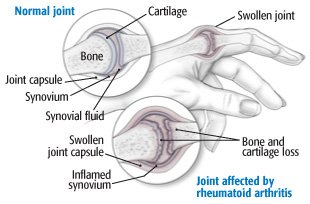Arthritis Treatment Options
There are many treatment options which you should know about. Over time,Then arthritis intervened, leaving your joints swollen, painful, and stubbornly unwilling to let you do even the simplest everyday tasks.
Regardless of whether you've developed osteoarthritis with age, you have rheumatoid arthritis or a painful case of gout, you don't have to let joint discomfort and stiffness prevent you from living. Your doctor has a whole range of medications and recommendations to relieve your pain and protect your joints from further damage.
An effective arthritis treatment regimen can help manage the disease. you may try several different treatments and change your treatment plan. Finding the best treatment for you can be a long process.



Treatment Goals
The goals of arthritis treatment are to:
1 - Decrease arthritis symptoms
2 - Slow progression of the disease
3 - Prevent or minimize joint damage and deformities
4 - Maintain joint function
5 - Preserve mobility and range-of-motion
People with early symptoms of arthritis are often inclined to self-treat with over-the-counter medications, topical creams, or conservative measures such as ice and heat. The Arthritis Foundation recommends seeing a doctor if you have joint pain, stiffness, or swelling which persists for two or more weeks, whether or not your symptoms began suddenly or gradually. Only a doctor can diagnose arthritis. An accurate diagnosis is needed so treatment can begin.
A rheumatologist (arthritis specialist) will help you understand all of your treatment options and also help you steer clear of unproven remedies. Discuss the potential benefits and risks of each treatment option with your doctor.
Arthritis Medications
Medications are considered traditional treatment for arthritis. Depending on the severity of your arthritis symptoms when you first consult with your doctor, one or more medications will likely be prescribed.
Drug classes used to treat arthritis include:
NSAIDs (nonsteroidal anti-inflammatory drugs)
COX-2 Inhibitors
Pain Medication (analgesics)
Corticosteroids
DMARDs (disease-modifying anti-rheumatic drugs)
Biologic Response Modifiers (Biologics)
Arthritis Drugs: What Are My Options?
Test Your Knowledge: Arthritis Medications
Ask why your doctor prescribed specific medications, inquire about expected benefits, and when you may notice improvement. Ask if there are potential side effects associated with the medications and how you will be monitored (i.e. do you need routine blood tests?). Make sure you understand the goals. If you understand, you are more likely to be compliant with the treatment plan.
Injections Into a Joint
There are several types of injections which can be given locally into the joint. Viscosupplementation is a procedure that involves the injection of gel-like substances (hyaluronates) into a joint (currently approved for knee) to supplement the viscous properties of synovial fluid. The five types are:
Synvisc
Orthovisc
Supartz
Euflexxa
Hyalgan
Local steroid injections can be used for a specific, painful joint. Three steroid injections per year into a joint is the maximum allowed by most doctors. Steroid injections were used long before viscosupplementation became a treatment option. Both are still used though, depending on patient preference.
Natural Treatments
Some people are more interested in natural treatments than traditional medications. If you prefer a natural approach to treating arthritis, it's still imperative that you tell your doctor what you are taking or what you want to try. There are many natural treatment options, also referred to as alternative treatments, which are popular but not fully endorsed for effectiveness and safety. Be aware.
Acupuncture / Acupressure
Biofeedback
Chiropractic
Magnets
Massage
Meditation
Tai Chi
Yoga
Supplements such as fish oil, glucosamine, chondroitin, MSM
Are Natural Therapies Useful for Arthritis Patients?
Alternative Treatments for Arthritis: Awareness is the Key
Test Your Knowledge: Alternative and Natural Treatments
Traditional and Alternative Treatments - Where Should the Paths Cross?
Complementary Medicine
The terms complementary medicine and alternative medicine are sometimes used interchangeably. The difference is that complementary treatments are used together with your usual treatment regimen. Alternative treatments imply that they are used instead of your usual treatment.
Regular exercise is strongly recommended for arthritis patients. Exercise can reduce pain and improve physical function, muscle strength, and quality of life for people with arthritis.
Exercise: Essential Treatment for Arthritis
Over One-Third of Arthritis Patients Get No Exercise
How to Exercise When You Have Arthritis
Arthritis and Exercise Quiz
Eating a nutritious diet is important for maintaining ideal weight and for bone health too. There is no known diet which can cure arthritis, but eating well is important.
Diet and Arthritis: The Link is Complex
Fruits and Vegetables May Cut Arthritis Risk
Arthritis and Diet Quiz
Stress management may also be useful as a complementary treatment. Reducing stress helps to reduce pain and stiffness associated with arthritis.
The Effect of Stress on Arthritis
Surgical Options
Joint surgery is usually considered a last resort treatment option. Joint surgery is typically considered if other more conservative treatment measures are unsatisfactory or have stopped working. When joint damage is severe and when pain interferes with daily activities, joint surgery may be an option with the goal of decreasing pain and restoring function.
Arthrodesis (fusion)
Arthroplasty
Osteotomy
Joint replacement
Revision joint replacement
Resection
Synovectomy
Partial knee replacement
Too Young for Joint Replacement?
Test Your Knowledge: Types of Joint Surgery
Joint Replacement: When is it the Right Time?
Pain Relief
Pain is debilitating and can greatly interfere with daily living. Better treatments are always being sought, so people living with arthritis pain can achieve pain relief.
No comments:
Post a Comment